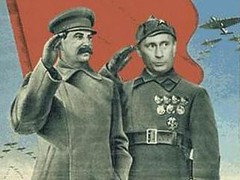 Most news reports last week on the double political murder in Moscow focused on Stanislav Markelov, the intended target of the assassination, rather than Anastasia Baburova, his fellow victim. With reason – Markelov was a prolific lawyer, who excelled in taking on human rights cases that few others in Putin’s Russia would take. He had long demonstrated a courage in pursuing these cases that earned him enemies far and wide – something that would make it hard to identify who had him killed even if anyone in a position to do so would want to.
Most news reports last week on the double political murder in Moscow focused on Stanislav Markelov, the intended target of the assassination, rather than Anastasia Baburova, his fellow victim. With reason – Markelov was a prolific lawyer, who excelled in taking on human rights cases that few others in Putin’s Russia would take. He had long demonstrated a courage in pursuing these cases that earned him enemies far and wide – something that would make it hard to identify who had him killed even if anyone in a position to do so would want to.
At RFE/RL, Zoya Svetova runs through the list. Was it the Russian colonel who raped and strangled a Chechen woman, and whose early release from prison Markelov was trying to stop that very day? Maybe it was the major from a special police forces unit, who once threatened to kill Anna Politkovskaya (the journalist who was assassinated in 2006) and went on to torture a Chechen student to death? Markelov represented both Politkovskaya and the Chechen. Perhaps it had to do with the case of a local newspaper’s editor-in-chief, who had gotten in the crosshairs of the mayor and was mysteriously assaulted? He is still in a coma; Markelov represented him in court. Maybe it was the fascists, because of the anti-fascists Markelov defended? Maybe Markelov was killed because of his involvement in the case of a man who disappeared last year after accusing the Chechen authorities of running secret prisons?
Svetova’s commentary (“Russia’s ‘Open Season’ Of Murder Continues”) lists some of the recent victims on the “unending list” of political assassinations. Just a week before it was Markelov’s turn, a Chechen was assassinated in Vienna as he left a grocery store. It was Umar S. Israilov, who had fled Russia after he’d accused Chechnya’s president of participating in kidnappings and torture sessions. (They’d already tried to force him back by abducting and torturing his father.)

Anastasia Baburova
The Washington Post highlighted the trend most pointedly (“Two More Critics of Vladimir Putin Take Bullets in the Head”): “The larger story here is of serial murders of Mr. Putin’s opponents, at home and abroad. Ms. Baburova [..] is at least the 15th journalist to be slain since Mr. Putin took power. No one has been held accountable in any of the cases [..].”
But amidst the dismay about Markelov’s death, there were fewer personal notes about Baburova, a friend of Markelov and a journalist at the opposition Novaya Gazeta, who wrote about racism and the frequent attacks on ethnic minorities.
She was the daughter of a factory worker in the Crimea, and was studying journalism at the Moscow State University in the evenings. She was also a radical activist, who had joined the anarchist group Autonomous Action the day before she was murdered. According to the group’s tribute, she “was into physical sports such as parachute jumping [and] well trained in martial art”. It didn’t save her; she was shot while trying to apprehend the gunman.
Her colleagues from the Novaya Gazeta paid tribute to her. Markelov was their legal advisor; Baburova was one of their newest colleagues. You will forgive them a sense of pathos; Baburova is the fourth NG journalist to be murdered (NG co-owner Aleksandr Lebedev has now requested that his journalists be permitted to carry guns).
Anastasia Baburova only joined Novaya gazeta in October 2008.
She very much wanted to work for the newspaper and decided to investigate crimes committed by Russia’s Nazi groups. She had very little time to do her job.
In essence, Stanislav and Anastasia were simply decent people who could not tolerate what the majority in our country has accepted. That was enough for the lords and masters of Russia to issue their verdict [..].
[..] Nastya Baburova was also a romantic rebel, an anarchist who took part in the anti-fascist movement and the Dissenters’ marches. It was no accident that she found herself in such company: she quite consciously chose that path in life.
In the eyes of the regime and ordinary people, who only want to keep out of trouble and quietly survive the present regime, Nastya’s choice also made her an outsider. Therefore few people in our country could die as she did, struggling to apprehend the assassin. In the office in front of which Stas and Nastya were shot people heard gunfire and even understood immediately what had happened. They were afraid to go out, however, or even to glance through the window. [..]
It was not by chance that Stanislav and Nastya had been friends for many years (she was only 25!) They were people who had an absolutely clear understanding of good and evil. Such abstractions acquire meaning when people act.
The killers have no fear because they know they will not be punished. But neither are their victims afraid, because when you defend others you cease to fear. Those today who are fearful are the people who keep out of trouble, trying to survive these bad times, when the bad times (for some reason) never seem to end.






